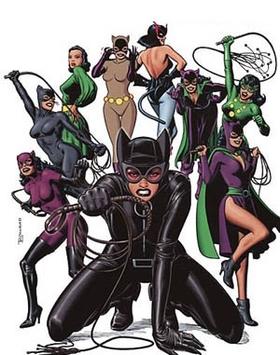However, those foils can be overcome via time and persistence but what if your leading lady happens to be a villianess or more of an anti-heroine? The game is set up a bit differently there yet not impossible to play to win. In Tim Hanley's latest comic book character history, The Many Lives of Catwoman, he details the numerous twists and turns that this "felonious feline" has taken over the years.
The character was introduced into the Batman comics in 1940 and she quickly become one of the most popular enemies of the Caped Crusader, particularly due to the flirtatious cat and mouse games they played with one another.
Known by numerous aliases, her most persistent name was Selina Kyle and her M.O. was that of a jewel thief who had a fierce fondness for cat related items as well. While her outfits and various methods of crime changed over the years, Selina's teasing relationship with Batman pretty much stayed the same:
Unfortunately during the comic book censorship craze of the 1950s, Catwoman was kept out of the Batman series for about thirteen years due to concerns over her image. Oddly enough, she paid more of a penalty for such fear-mongering than many of the male characters under scrutiny at the time.
Thankfully, the campy Batman TV show in the sixties brought her back from pop culture exile. Once again, Selina became the bad girl belle of the Batman ball due in part to actress Julie Newmar's sexy sass in her depiction of the "Princess of Plunder."
While Lee Meriweather(who played Catwoman in the TV movie version) and Eartha Kitt in particular, gave the role their own special nuance, Julie Newmar is still considered to be the quintessential version of this frisky frenemy:
Catwoman also came back to the comic books, even having her own separate story line in a series of her own by the seventies and 1980s. Yet, she also was showcased as less of a thief and more of a former "working girl" turned street vigilante.
The character was redefined once again by a live action version, this time in the now iconic Batman Returns in 1992. Hanley devotes a full chapter to this film, complete with behind the scenes info and makes a very credible argument for the notion that Catwoman was the only major character who completed a full emotional arch and achieved success in her goals, unlike her distracted male counterparts:
A full chapter is also given to the infamous flop that was the Catwoman movie in 2004. Starring Oscar winner Halle Berry and credited with several writers, the film was universally panned by audiences and critics alike as well as a highlight of the Golden Raspberry awards.
Hanley goes over the twenty year development that lead to this cinematic catastrophe, with scripts that bordered on ludicrous to begin with(an early one had Catwoman sent to a town called Oasisburg with amnesia to fight a cult of superheroes lead by Captain God) to producers who insisted that Catwoman had magical powers(she doesn't).
Hanley states the case that this film was a wasted opportunity and an easy excuse for Hollywood executives to not greenlight any female driven superhero movies for far too long. Hopefully, that all will change with the success of the Wonder Woman movie, giving Catwoman a chance to climb out of the kitty litter penalty box on that account:
In addition to other live action takes on the character, such as Anne Hathaway in The Dark Knight Rises and a young Selina Kyle on the TV series Gotham, the book also showcases the animated versions of Catwoman, both for the small screen and video games.
The comic book/graphic novel incarnations of Catwoman are prominently featured as well, including an arch that made Selina the head of a mobster family in order to clean up some sins of the past. It's interesting to see the influences that various artists and writers have had over the character, which Hanley chronicles in engaging fashion.
As someone who has read Tim Hanley's previous works about Wonder Woman and Lois Lane, I was more than eager to snatch this comic book catnip up and happy to report that it is a fine read indeed. Much like his other books, Hanley gives the reader a fully formed look at the character and her pop culture fortunes over the years, adding new insights into the material and shining a spotlight on certain myths that don't hold up in full focus.
The Many Lives of Catwoman is an excellent portrait of one of the most celebrated and debated pop culture creations of our time and yes, a purr-fect way to look beyond the cat suit and into the heart of such an independent subversive spirit:




No comments:
Post a Comment